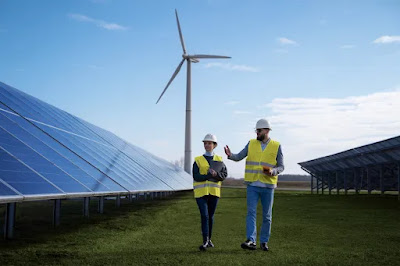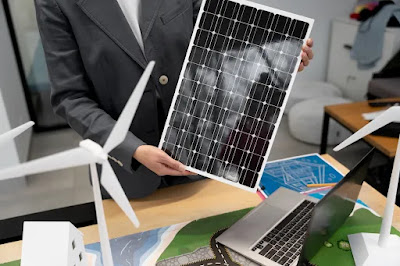The Netherlands, a nation well-known for its windmills, is stepping up its renewable energy initiatives. By 2050, the nation hopes to have a fully sustainable and carbon-neutral economy. The Netherlands has made significant investments in renewable energy technologies to achieve this goal.
We'll examine the top ten renewable energy technologies in the Netherlands in more detail in this blog article.
1. Wind Power
The Netherlands is well known for its windmills, which have been used for centuries to power a variety of tasks including water pumping and grain grinding. Nowadays, wind energy continues to play an important role in the nation's mix of renewable energy. With more than 2,200 wind turbines, the Netherlands has set a goal to produce 11.5 gigawatts (GW) of wind energy by 2023.
2. Solar Power
Due to its decreasing cost and rising efficiency, solar energy is becoming more and more popular in the Netherlands. The nation has made significant investments in solar panel installation projects and has set a goal to produce 16 GW of solar energy by 2050.
3. Geothermal Power
The vast geothermal system in the Netherlands uses heat from the Earth's core to produce power. The nation has more than 20 geothermal power facilities and wants to use more geothermal energy overall.
4. Bioenergy
Organic materials including wood, agricultural waste, and animal dung are the source of bioenergy. The Netherlands has a sizable bioenergy industry and has set the goal of producing 25 PJ of energy from biomass by 2020.
5. HydroPower
Rivers and tides are two examples of moving water that generates hydroelectricity. The Netherlands has made investments in small hydro plants even though the country does not have a considerable hydro energy potential.
6. Tidal Power
The tidal cycle is what produces tidal energy. The Netherlands offers considerable potential for tidal energy and a lengthy coastline. The nation has made investments in tidal energy research and development and has erected several modest tidal turbines.
7. Wave Power
The motion of ocean waves produces wave energy. Despite having a limited wave energy potential, the Netherlands has made investments in the creation of wave energy systems.
8. Energy Reserves
Any system that uses renewable energy must include energy storage. The Netherlands has made investments in several energy storage technologies, including compressed air, pumped hydro storage, and batteries.
9. The Smart Grid
Intelligent electrical networks known as "smart grids" are capable of automatically balancing the supply and demand for electricity. To increase the effectiveness and dependability of its energy infrastructure, the Netherlands has invested in smart grid technologies.
10. Electric cars
In the Netherlands, EVs are getting more and more well-liked. By 2025, the nation wants 1 million electric vehicles on the road. To facilitate the uptake of EVs, the Netherlands has also made investments in EV charging infrastructure. Learn More Info
Unknown information regarding "Renewable Energy Technology in the Netherlands"
- The world's first floating solar farm, which was inaugurated in 2019, is located in the Netherlands. The farm, which has 73,000 solar panels on a lake not far from Amsterdam, can power about 7,200 households.
- The Netherlands is one of the major offshore wind energy producers in the world, and the North Sea is home to several sizable wind farms.
- One of the most energy-efficient vehicles ever created is a solar-powered vehicle made by the Netherlands business "Lightyear" that can travel up to 725 kilometers on a single charge.
- More than 30% of new automobiles sold in the Netherlands are electric, making it one of the countries with the greatest adoption rates of electric vehicles worldwide.
- The Dutch government revealed plans to erect a sizable green hydrogen plant driven by offshore wind energy in 2020. The plant will be one of the biggest in the world, producing up to 800,000 tonnes of green hydrogen annually.
- The city of Rotterdam, the Netherlands is home to one of the biggest bioenergy facilities in the world. The facility generates enough electricity from wood chips and other biomass to power about 800,000 homes.
- The Dutch business "Ecofalt" has created a special kind of asphalt that heats roadways using solar energy and recycled plastic trash, eliminating the need for salt and other chemicals in the winter.
- The "Green Village," a real-world testing ground for sustainable inventions, may be found on the campus of Delft University of Technology in the Netherlands. The community acts as a trial ground for emerging technologies and is totally powered by renewable energy.
- A special kind of tidal turbine that can be deployed in rivers and other inland waterways and serves as a source of clean energy in cities has been created by the Netherlands business "Tocardo."
- By 2030, the Netherlands wants to cut its greenhouse gas emissions by 49%, and renewable energy technology will be crucial to accomplishing this target.
In Conclusion, The Netherlands is working hard to transition to a fully sustainable and carbon-neutral economy by 2050, to sum up. The nation has made investments in several renewable energy technologies, including tidal, geothermal, solar, wind, and solar. To facilitate its transition to renewable energy, the Netherlands has also made investments in energy storage, smart grids, and electric vehicles.
The Netherlands is ideally situated to become a global leader in renewable energy technologies as the world moves towards a more sustainable future. The nation's dedication to innovation and sustainable development has facilitated the development of renewable energy technologies. The Netherlands can develop into a sustainable and carbon-neutral economy, as evidenced by the top 10 renewable energy technologies discussed in this blog post.





_11zon.png)

No comments:
Post a Comment